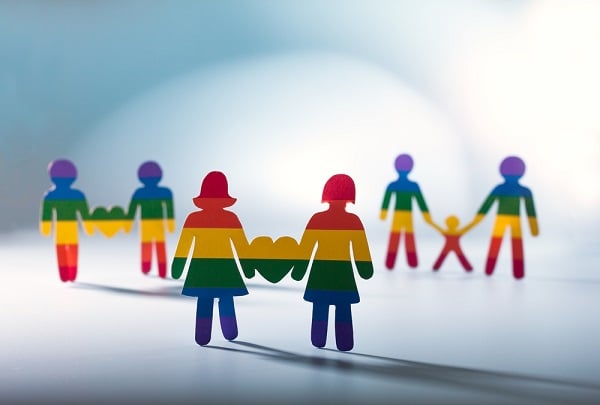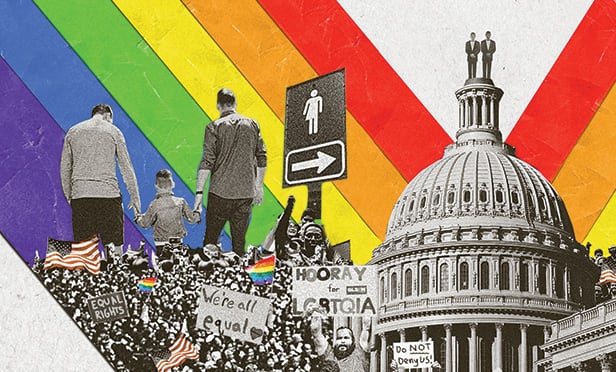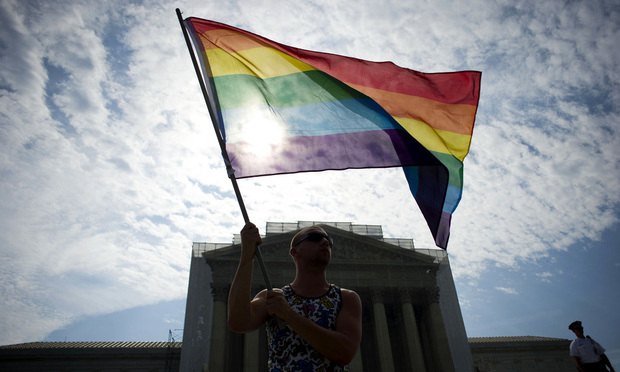 This is the secondruling in the U.S. to break with precedent in finding thatworkplace discrimination based on sexual orientation is illegal.(Photo: Shutterstock)
This is the secondruling in the U.S. to break with precedent in finding thatworkplace discrimination based on sexual orientation is illegal.(Photo: Shutterstock)
Gay workers and their corporate supporters wona legal victory over the Trump administration as a federal appealscourt ruled that firing people over their sexual orientation isa form of illegal sex discrimination.
|The appeals court in Manhattan overturned itsown previous rulings, saying “legal doctrine evolves.” It's thesecond ruling in the U.S. to break with precedent in finding thatworkplace discrimination based on sexualorientation is illegal. A third appeals court ruled the other waylast year. The split among the courts sets up a possible SupremeCourt showdown.
|“Sexual orientation discrimination — which is motivated by anemployer's opposition to romantic association between particularsexes — is discrimination based on the employee's own sex,” JudgeRobert Katzmann wrote in an opinion for the full court's majorityon Monday.
|Related: Marriage equality & theworkplace
|Skydiving instructor Donald Zarda claimed he was fired byAltitude Express Inc. because he was gay. He argued that Title VIIof the Civil Rights Act of 1964, which bars workplacediscrimination on the basis of sex, race, color, national originand religion also includes sexual orientation. Zarda, who sued in2010, died in a base-jumping accident in Switzerland in 2014. Hisestate and relatives carried on with the case.
|“I think this would have meant the world to him. I think hewould have been very excited and very encouraged,” said MelissaZarda, Donald's sister. “I feel strongly that in the workplaceemployees should be evaluated based on their job performance and bytheir work ethic and never by who they love.”
|Zarda wasn't fired for being gay, and his employer knew he wasgay when he was hired, Saul Zabell, the lead attorney representingAltitude Express, said after the ruling was handed down. He saidthe company agreed Title VII should be amended to include sexualorientation.
|“It exceeds the judicial mandate to re-interpret Title VII tosay that, although for the last 30 years Title VII has not coveredsexual orientation, now it does,” Zabell said. “Shame on Congressfor not being able to get it together to change Title VII.”
|A panel of three appeals court judges ruled against Zarda inApril. He was granted a rehearing before the full appeals court, whichhas authority over federal courts in New York, Connecticut andVermont. In the majority opinion, Katzmann said sexual-orientationstereotyping falls within Title VII's prohibition againstdiscrimination “because sex is necessarily a factor in sexualorientation.”
|Ten judges agreed on the result of the case, although fivedisagreed with the majority's reasoning. Three dissented from theoutcome.
|Trump administration
“This is a long due victory for equality.” said SarahWarbelow, legal director for the Human Rights Campaign, whichadvocates for lesbian, gay, bisexual, transgender and queerrights.
|The Trump administration argued in support of the skydivingcompany, based on New York's Long Island. The U.S.said courts must take legislative intent intoconsideration, and that Congress didn't have the LGBT community inmind when it crafted the law.
|A group of 50 companies and organizations — including MicrosoftCorp., Alphabet Inc.'s Google and Viacom Inc. — filed documents in June arguing discriminationbased on sexual orientation should be illegal.
|The government's decision to oppose a gay worker has been citedby Trump's critics as evidence that he's pandering to religiousconservatives. The president's supporters say the courts need to bereined in and shouldn't be extending rights that only Congress canestablish.
|The Justice Department is committed to protecting the civil andconstitutional rights of all individuals, Devin O'Malley, adepartment spokesman, said in an emailed statement.
|“We remain committed to the fundamental principle that thecourts cannot expand the law beyond what Congress provided,”O'Malley said. “The position that the department advocated in thiscase has been its longstanding position across administrations andremains the law of nine different Courts of Appeals.”
|Congress for years has declined to pass legislation explicitlybanning anti-gay discrimination in the workplace and most statesdon't have such laws. Attorney General Jeff Sessions, a former U.S.senator from Alabama, was one of the lawmakers who sought to blocksuch legislation. He also voted to ban same-sex marriage nationwideand sought to bar LGBT Americans from the military.
|Title VII has been broadened by the courts over the years. TheSupreme Court in 1986 ruled that the law, previously limited to“tangible economic discrimination,” also prohibited sexualharassment. A few years later, the high court determined the lawbarred discrimination in the workplace based on gender stereotypes,in a suit brought by a woman who claimed she'd been deniedpartnership at an accounting firm because her clothing andappearance didn't conform to sex stereotypes.
|But that's where the courts drew the line. In 2000, a federalappeals court ruled that the addition of protection for genderstereotypes couldn't be used to “bootstrap” protection based onsexual orientation.
|A handful of gays and lesbians have filed suits in recent years,with mixed success.
|In 2015 the U.S. Equal Employment Opportunity Commission said aclaim of bias based on sexual orientation can be brought underTitle VII. In March 2017, the appeals court in Atlanta ruledagainst a lesbian who was fired from a hospital, and the SupremeCourt declined the hear the case. A month later, the appeals courtin Chicago ruled in favor of a lesbian who was fired by a Christiancollege.
|In his dissent on Monday, U.S. Circuit Judge Gerard Lynch saidhe'd “be delighted to awake one morning and learn that Congress hadjust passed legislation adding sexual orientation to the list ofgrounds of employment discrimination prohibited” under the law. ButCongress, he added, has so far done “no such thing.”
|The case is Zarda v. Altitude Express, 15-3775, U.S. Court ofAppeals for the Second Circuit (Manhattan).
Complete your profile to continue reading and get FREE access to BenefitsPRO, part of your ALM digital membership.
Your access to unlimited BenefitsPRO content isn’t changing.
Once you are an ALM digital member, you’ll receive:
- Critical BenefitsPRO information including cutting edge post-reform success strategies, access to educational webcasts and videos, resources from industry leaders, and informative Newsletters.
- Exclusive discounts on ALM, BenefitsPRO magazine and BenefitsPRO.com events
- Access to other award-winning ALM websites including ThinkAdvisor.com and Law.com
Already have an account? Sign In





